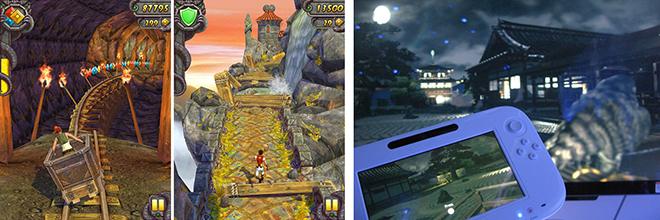Mobile platforms running iOS and Android are increasingly popular among North American game developers, according to a new study, while traditional consoles and their portable counterparts are seeing less interest.
Mobile OS games, such as the one on the left, are drawing interest from developers, even as traditional consoles, seen on the right, struggle.
For its GDC 2013 State of the Industry survey, the Game Developers Conference, polled more than 2,500 North American Developers who attended GDC 2012 or plan to attend GDC 2013. Respondents' answers painted a picture of game industry in flux.
Smartphones and tablets were the most popular development platform among respondents, with 55 percent of them saying they were developing their current games for such devices. Fifty-eight percent of developers said they plan to release their next games on mobile devices.
PCs and Macs were the next strongest platforms, with 34.6 percent of developers having just released a game for PC/Mac, 48 percent developing current games for the platform, and 49 percent planning their next games for the platform.
Traditional consoles fared relatively poorly in the survey, with Nintendo faring the worst. Among respondents, 13.2 percent were currently developing for Microsoft's Xbox 360, while 14 percent were targeting the platform for their next game. For Sony's PlayStation 3, 13 percent were releasing their current game on it, with 12.4 percent targeting it for their next game. Eleven percent of respondents said they were targeting both Xbox and PlayStation. Nintendo's Wii U had only 4.6 percent of developers currently working on a game, with 6.4 percent saying their next game would come to Nintendo's new console.
The portable handheld development picture was even less encouraging, according to GDC. Two percent of respondents had made their last game for Sony's struggling PS Vita portable, while 4.2 percent were currently working on a game for it, and just over five percent planned their next game for the platform. Nintendo's 3DS had only two percent of respondents working on games for it, with 2.8 percent planning to release their next games on the portable console.
Developers indicated strong interest in tablets and smartphones, as well as PC-based TV consoles. Next-generation consoles from Sony and Microsoft also drew interest, but developers have yet to warm to Nintendo's Wii U.
While they may be indicative of the state of the wider game development industry, it is difficult to extrapolate GDC's numbers to a broader statement on the game industry on the whole. Fifty-three percent of respondents identified themselves as "indie developers," with 46 percent of respondents working in companies of 10 people or fewer.
Those numbers may skew the results in favor or mobile devices, which typically require much less in the way of resources and funding to develop. Typical titles on consoles require much more in the way of funding and labor than do the casual gamer-oriented titles seen on smartphones and tablets. The small company/small screen skew was apparent also in the studies findings on funding, with 35 percent of respondents indicating they were financing their games from personal funds, while only 10 percent were primarily publisher-funded.
 Kevin Bostic
Kevin Bostic







-m.jpg)






 Charles Martin
Charles Martin

 Malcolm Owen
Malcolm Owen
 William Gallagher
William Gallagher

 Christine McKee
Christine McKee
 Wesley Hilliard
Wesley Hilliard









29 Comments
Mobile games are just getting better and better!
I download Real Racing 3 last night, it just came out for the US. It's the best one so far, and it's also freemium. 16 GB iPad owners beware, it's a huge game. On one of my iPads, it's taking up 1.8 GB of space. I only have one other app installed that's bigger than it.
Mobile gaming will never replace consoles for me.
Mobile gaming will never replace consoles for me.
Maybe not, but it is and it will for many others.
Add bluetooth controler support for the iPad, and with the next generation of mobile chips, consoles are finished. The addressable market of iOS devices is far superior to that of consoles, and is more attractive.
I can't even remember the last time I turned on my PlayStation 3.
Mobile gaming will never replace consoles for me.
they will easily replace that $60 per game price tag for me
and don't talk about the game quality, most of the budget of a game is on marketing